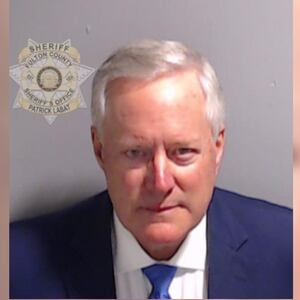Mark Meadows, the former Trump White House chief of staff, really wants to make a federal case out of his indictment in Fulton County, Georgia.
Meadows wants out of the Fulton County court so badly that on Monday, he took the enormous risk of testifying in his own criminal trial and subjecting himself to cross-examination by the Fulton County District Attorney’s Office.
Meadows’ longing for federal court may seem puzzling because switching is but a change of courthouses. In federal court, Meadows will face the same charges, under the same state laws (including the Georgia RICO Act), brought by the same prosecutor.
However, Meadows may be counting on the fact that a federal trial would give him a broader geographic jury pool which might be more favorable to him. He also may think that a federal court would be more sympathetic to his argument that his position as a federal official should automatically make him immune from a state criminal prosecution.
Theoretically, Meadows’ removal argument under 28 U.S. code § 1442 doesn’t look that hard to make, since he only needs to show that he was a federal official at the time and that he can raise a “colorable legal defense.” Meadows was a federal official at the time as Trump’s White House chief of staff, so he can meet that part of the legal standard.
He also has a “federal defense” to raise based on so-called “Supremacy Clause Immunity,” meaning that as a federal officer he cannot be criminally prosecuted by a state for actions performed in his official federal capacity. The question though is whether that defense is a “colorable one” in these circumstances. In plain English, a “colorable defense” is just one that passes the smell test. That may prove challenging for Meadows.
The problem for Meadows is that he needs to convince federal judge Steve C. Jones–a former state judge appointed to the U.S. District Court by President Obama–that his actions in allegedly conspiring with Trump and 18 other co-defendants to overturn the election results in Georgia were part of his job description as White House chief of staff.
Holding aside the fact that the Hatch Act bars a federal official from using their office to engage in partisan political activity, Meadows must prove that his involvement in such acts as the phone call to Brad Raffensberger, in which Trump pressured the Georgia secretary of state to find votes for Trump, were just part of doing his job.
The federal government does not have the power to regulate presidential elections. A strict reading of Article II, Section 1, clause 4 of the Constitution would allow only regulation of the “time” of choosing presidential electors and certainly there is no known precedent for a White House chief of staff overseeing any aspect of a state election process.
Meadows’ five-hour long testimony in federal court on Monday, including cross-examination by prosecutors, was a rare sight in a criminal trial and illustrated the frailties of his argument. He repeatedly alluded to a “federal nexus” for his participation in meetings and phone calls alleged to be part of the criminal conspiracy to overturn Biden’s victory over Trump.
He also emphasized that as Trump’s chief of staff he had to arrange calls and meetings for the then-president—implying that such ministerial functions were part of his official duties and that to the extent those calls or meetings were criminal he should bear no liability. But trying to compartmentalize his administrative duties from the overall plot is an uphill climb for Meadows given the depth of his involvement with the acts cited in the indictment. Of the two, the “federal nexus” argument is Meadows’ best bet to at least win removal.

Former U.S. President Donald Trump's Chief of Staff Mark Meadows walks out of the United States District Court for the Northern District of Georgia, where a hearing on his petition to move the Fulton County case to federal court in the 2020 election case took place, in Atlanta, Georgia.
Dustin Chambers/ReutersJudge Jones could decide that while Meadows’ claim that everything he did was proper under the theory that the federal government—and therefore he and Trump—had some kind of responsibility to ensure that the presidential election was conducted properly may be a weak defense but nonetheless a defense. That would get Meadows out of Georgia state court, but winning an acquittal with this defense will prove much harder than merely asserting it.
The willingness of Meadows and his defense team to expose him on the witness stand seems even more risky since Meadows submitted to interviews with DOJ Special Counsel Jack Smith in the federal criminal case involving many of the same actions. By allowing Meadows to speak with DOJ about the same actions that he ended up getting charged for by Fulton County District Attorney Fani Willis involves not only Fifth Amendment waiver issues but also creates opportunities for inconsistencies in his testimony that could result in federal false statements charges.
However there may be more to Meadows’ strategy than meets the eye. His airing of the “Supremacy Clause” immunity defense gives both him and Trump a test run of the defense.
If Meadows were to win the removal it may signal to him and to other defendants that the defense may have some merit. Conversely, if he gets dunked on by Judge Jones and can’t even remove the case, that may call for a reassessment of both his defense and Trump’s eventual defense.
Additionally, the more efforts by the defendants to split up their cases, whether through removal or by some seeking speedy trials, the more work there is for the prosecution and, most importantly, the more potential delay is created for Trump. Whether he wants to or not, Mark Meadows continues to serve Trump.







